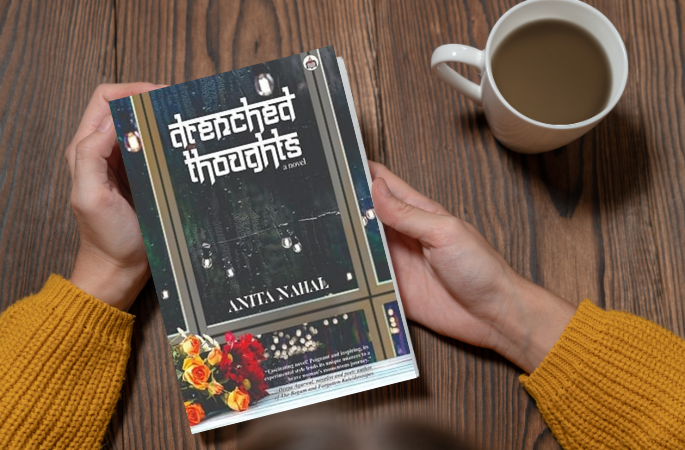Drenched Thoughts, A Novel by Anita Nahal. (Authors Press, New Delhi, 2023)
ISBN: 978935529637
Price: Rs 495
Pages: 214
This book had to be written. Every intelligent, professionally qualified, smart woman who goes through an abusive marriage owes it in a way, to share with the rest of the world what it is to function within a retrograde social system. Let us recall Maya Angelou’s memorable words:
‘Each time a woman stands up for herself, without knowing it possibly, without claiming it, she stands up for all women.’
Anita Nahal, an Indian American author, academic and well-known poet, has four books of poetry and ten other books, including flash fiction, writings for children and anthologies that she edited. Honours include a nomination for the Pushcart Prize and a best poetry book for What’s wrong with us kali women, in 2021 for Ars Notoria. Her poems are prescribed in a course on multicultural society at the Utrecht University, Netherlands. drenched thoughts is her debut novel. As a diasporic writer, her Indian experience widens the lens on her perspective as South Asian, and now American, from which Cyril Dabydeen says in his blurb, ‘American literature has much to gain…’
The novel tells the story of Priya, who, even before moving over to the US, had considerable work experience in India as an academic and judge, with US-funded grants and invitations under her belt. As an appointed judge, she foregoes her pension and career to leave for the US in her early forties with her young son. The only way to end her toxic marriage.
Every thinking reader would respect Priya for her decision because unlike many other intelligent, professionally qualified women in India who endure a failed marriage to seek social approval, Priya does not, for she always had a sense of justice. A legal career seems to be a natural choice. Readers who wonder why a judge equipped with legal remedies could not battle it out will soon find that Priya is pragmatic, has good sense and is very grounded with an uncanny instinct for anticipating the practical consequences of any legal action taken against her husband, Satinder. Sure, there were some acts. One such act needed proof of emotional maltreatment through bodily scars. Later, in 2005, the Protection of Women from Domestic Violence Act took cognisance of verbal and emotional abuse. Still, before that, as says Priya wisely, a woman couldn’t go to the police station at night for fear of being raped by the very ‘custodian’ of law who is to protect people. She cites one such case to her father.
Priya fears for her safety and wants to protect her adorable young son Avijeet from his father. When she seeks legal advice from a renowned senior, she gets a confirmation of her worst fears. The man will do something violent whether you divorce him or not, she is told. ‘You’re a judge; you know how things work.’ That clinches the matter for Priya. She knew she could never live in India after getting a divorce. There are hundreds of Indian women whose ex-husbands continue to harass them even after a divorce. Priya arranges for her divorce with a lawyer in the south of North Virginia with her nineteen-year-old son as a witness.
In the sense of a far outreach of this novel, Nancy J. Alexander rightly highlights in her blurb that Priya’s life ‘is a universally appealing story of one woman’s struggle for safety and freedom.’ The urgency of this need comes through in Nahal’s very first poem:
‘Go Priya go
Run fast run
Take your son and go
To a place far away and then some.’
Once Priya reaches the US, while she is defined as an immigrant South Asian woman, her feminism graduates to the level of civil rights and human rights.
‘Priya was relentless in seeking justice And human rights. It became a natural practice.’
She will be like Rosa Parks, if need be, the American activist who led the Montgomery bus boycott.
She now has a wide circle of girlfriends with whom she bonds over things like love, parenting, finances, jobs, good wine, and other shared concerns. Interestingly, this circle of trusted friends becomes an alternate family for women in India and elsewhere. Priya also shares about the lives of other South Asian women friends who, too, were survivors like her. She relates how one of them is helped in her own traumatic marriage by Bill Clinton’s Violence Against Women Act 1994.
Next, she has to encounter the dilemma of hyphenated identities:
‘Why would I call myself with a hyphen? Stuck in the middle of me?
Did my relentless story not ripen?
To be full, why look at parts of me?’
Second-generation South Asians had to contend with derogatory labels such as Desi and ABCD, while ‘Diasporic people/writers’ was another glib term that blanketed them. She has a new appellation, ‘Single mom, immigrant, coloured, older woman.’ Through all this, together with the vagaries of dating casual, philandering men, Priya forges her own identity with poise and maturity, unsparing about her mistakes. ‘I got involved with men much lesser than me in many ways. I demoted myself,’ she laments to her son. The Nigerian writer Chimamanda Ngozi Adichie addresses this predicament head-on in her novel Americanah.
Priya’s sense of humour helps her keep a clear head: ‘Most Americans, she discovered, loved loving…What’s this whole confusion between I love you, and I’m in love with you…it’s just semantics, in the end it all comes to nought.’
drenched thoughts seems observational and autobiographical. There is both courage and candour. Women – and men who care- can learn a lot from this book. Structured with a narrative in prose that is interspersed with poems, it shows how effectively poetry accommodates sensitivities and vulnerabilities. The novel is a story of a woman’s self-actualisation.
The paradigms in the novel are relatable because of analogies to popular figures such as Tina Turner; ‘Love’s a game. Miss u, Tina Turner’ recalls “Who needs a heart when a heart can be broken” from the famous song “What’s Love Got to Do with It?” Or references to Bob Dylan and others.
Priya’s cathartic moments come when she showers. ‘Water is so special, a cleansing of the spirit, soul, sad thoughts, lonely tough times and for rejuvenation to create pleasant memories in changed or different times.’ Thus, the title of drenched thoughts is perfectly apt.
In the end, ‘She’d scoop some Ganga water and on her DIL and son sprinkle A new story spins A new journey begins.’
This is a novel that needs to be studied by university students, both for content and the multi-genre form. It will give a sound socio-cultural perspective to students who are into a multi-cultural range of inquiry.



